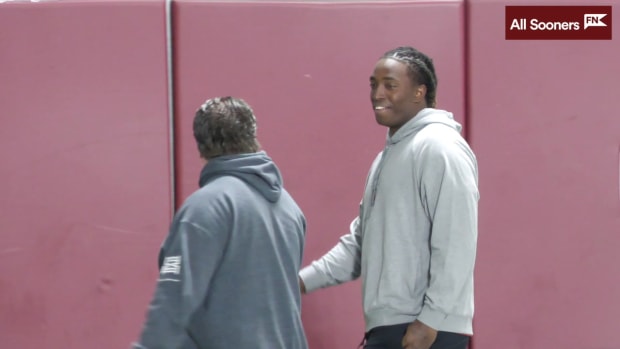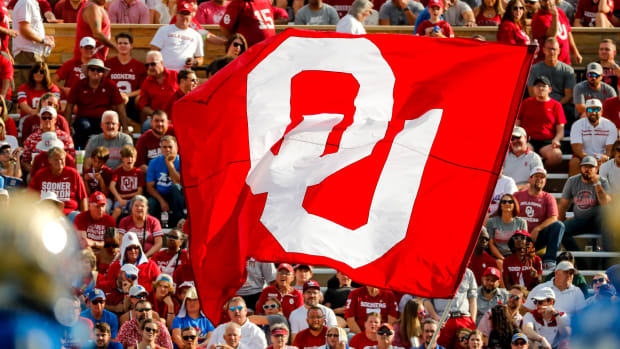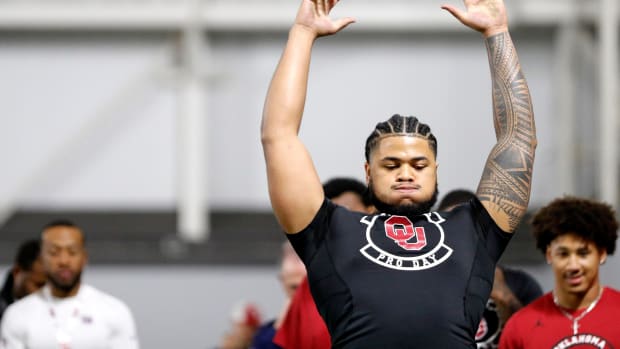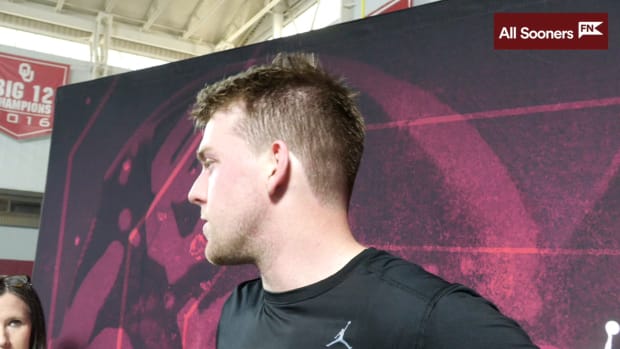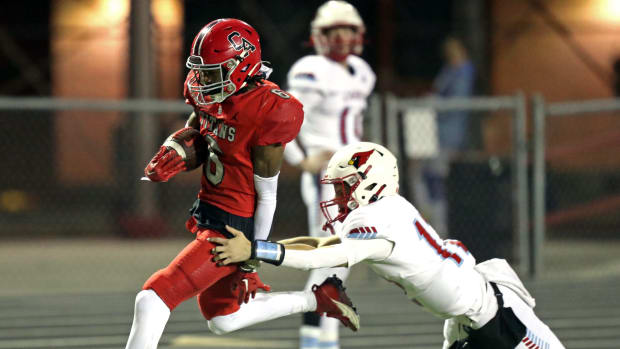Past Oklahoma QBs Caution Spencer Rattler: 'Those Stars Don't Mean Nothing'
Spencer Rattler begins his college football career this week trying to become the rarest of players at the University of Oklahoma: a 5-star quarterback recruit who lives up to his billing.
In the past 20 years — the modern era of throwing the football in Norman — the Sooners have recruited and signed just two 5-star quarterbacks out of high school. Neither one came close to his hype.
Brent Rawls was a can’t-miss 5-star out of Evangel Christian in Shreveport, LA, when he got to Oklahoma in 2001, but he never played a down at OU. And Rhett Bomar also arrived in Norman with 5-star fanfare but was gone after just one partial season as the starter.
Jason White played with both Rawls and Bomar.
“Yes I did,” White told SI Sooners. “Those guys, yeah, they were 5-star recruits and they got all the pub coming out of high school and this and that. But the day they step foot (on campus) as a Sooner, none of that means anything.
“Those stars don’t mean nothing when you get to college.”
White said something that Rattler — OU’s first 5-star QB recruit out of high school in 16 years — probably ought to embrace: older players on the team aren’t impressed with your high school accolades.
“They couldn’t care less what you did in high school,” White said. “Because I saw it with those two guys, Brent Rawls and Rhett Bomar. The older guys were like, ‘OK well, earn my respect. Then maybe you can talk about being a 5-star.’ “
Rattler should also be aware that, at Oklahoma, he’s actually the oddity: Three of OU’s four Heisman Trophy statues are from players who came to Norman as an unheralded 3-star recruit. Baker Mayfield, Sam Bradford and White all won the Heisman after climbing over more highly regarded prospects.
For what it’s worth, backup Tanner Mordecai was a 3-star recruit out of high school.
(Kyler Murray was an exception, too, but like Mayfield, he signed elsewhere out of high school and showed up in Norman after his college career began.)
Now, OU has Rattler starting his redshirt freshman year, and in 2021, the Sooners have a firm commitment from Caleb Williams, the consensus No. 1 quarterback in the country and Sports Illustrated All-American’s No. 1 overall recruit.
Examining the big picture, Mayfield and Riley changed the direction of quarterback recruiting at Oklahoma when Mayfield transferred from Texas Tech in 2014 and won the starting job in 2015. Watching Mayfield’s outrageous success that year convinced Murray to transfer to OU from Texas A&M. Rattler committed to OU just weeks after Riley got promoted to head coach. And seeing Mayfield, Murray and Alabama transfer Jalen Hurts take the position to new heights assured Williams that his future was at Oklahoma.
At that, White applauds Riley’s recruiting efforts — and also offers advice.
“It’s great for the program to have kids that want to come to OU, the 4- and 5-star kids,” White said. “Yes, you need to go after those kids, for sure. But you also need to be diligent in your recruiting process. Like, get to know their coaches, and get to know their family and get to know their parents. What kind of kid is this? Is he a kid that’s just been extremely gifted and hasn’t really had to work for this? Or is he a kid that has put in the time and is continuing, like, he knows that he can be better? Like, yes, he knows he might be the best in the country right now, but he knows that he can be better.
“So I really think when you start dealing with those 4- and 5-star recruits, you’ve really got to do your due diligence and get to know what kind of actual person they are rather than just say, ‘You know what? He’s a 4- or 5-star kid; let’s just go ahead and offer him a scholarship.’ ”
To that end, Riley feels ahead of the game. His comments Monday morning on the Big 12 Coaches Teleconference were almost as if he’s been conferring with OU’s 2003 Heisman winner.
“I think it’s two-fold,” Riley said. “What is that person’s skill level, their work ethic like if they were a highly rated guy? Are they somebody that’s come in thinking they have all the answers? Or are they somebody that’s been hungry to learn and improve and develop their skills?
“And then I think the second part of that answer is what’s the situation they’re walking into, as far as fit within a system, as far as players around them? I mean, there’s just so much that determines that success. But I think if you just narrow it down to just the quarterbacks, I think the guys, if they are as skilled as people thought they were, then a lot of times it comes down to work ethic and hunger. Is there a sense of satisfaction just because they were a high-profile guy? Or had offers from all these programs? Or are they still starving to get better and still have that fire that burns hot and have big goals that they’re fighting to achieve?
“I think that’s something you try your best to do as you’re evaluating these guys — not only how a guy throws the ball or moves or this or that, but also you try to get a sense of the hunger and inner competitiveness each one of these guys have.”
Paul Thompson wasn’t a highly recruited quarterback out of Leander, TX. His Rivals recruiting profile listed him as a 4-star “athlete” rather than a quarterback, and he was not considered much of a contender for the job behind Noah Allen.
But Thompson was White’s backup in 2003 and 2004 and won the starting job in 2005. He lost it after OU lost the ’05 season opener to TCU, but he got it right back the following year when Bomar, who threw 10 touchdowns and 10 interceptions as a redshirt freshman, got in NCAA trouble and was booted from the program.
Thompson had moved to wide receiver the previous season, but Bob Stoops asked him to come back and play QB. He did, and in 2006 he led the Sooners to the first of three straight Big 12 Championships. Thompson was a competitor, a leader and, ultimately, a winner.
“There’s been several 5-stars or 4-stars that have come in during my time at OU, and within a week or two I was like, ‘Well, those stars were wrong,’ ” Thompson told SI Sooners. “Whatever those rankings were, they were off. Either way. Either they don’t have enough stars or they had too many stars. Everyone’s got to earn their place once they get on campus.”
Thompson came in right behind Rawls (Rawls suffered and injured thumb, then fell out of a pickup truck, sustained a concussion and was demoted to fourth string before returning home to Louisiana) and then competed with Bomar. Thompson appreciated the way that Stoops and then-quarterbacks coach Chuck Long handled those outside expectations at his position. Their fairness with the depth chart allowed guys who came to campus with little or no fanfare to embrace the challenge.
“I came in with Noah Allen,” Thompson said. “Great quarterback there out of Pearland (TX). I’ve known Noah even after playing; I’ve got great respect for him. But he was more heralded that I was, and I remember just watching the all the all-star games, him being in it, me being on the back burner and not really being thought about — that’s motivation. You’re just comparing yourself to other recruits around your state, maybe, they’re a 5-star and you’re like, ‘Man, I’m better than him! There’s no way!’ Everyone thinks that, and it does just add a little chip on your shoulder.”
Riley need look no further than Heisman Park to see how grit and grind can push an unheralded player past a headliner. In fact, his first quarterback at East Carolina, Shane Carden, was a 2-star Rivals recruit who set every ECU passing record and got a shot in the NFL.
But the fact that Riley now gets to mentor his first 5-star quarterback recruit from start to finish — a guy that he went after early, a guy that chose Riley, a guy with a prodigious skill set and, Riley hopes, a blue-collar work ethic and a team-first attitude and carries no sense of entitlement — has to be enticing.
“The recruiting, the evaluation, how many stars guys have, all that, I mean, when they get here it’s about what they do here,” Riley said. “And obviously if they’ve got a good skill set and they’ve done a good job in high school, then I mean, yeah, you think their chances for success are higher. Does it mean every 5-star’s gonna work out? No. Does it mean every 2-star is not gonna be able to play at the Division I or even the professional level? No, of course there’s exceptions.
“But I think for the most part you’re talking about guys with a good skill set that have had some success at the high school level that you’ve just got to do your best to project. You know? Again, how do they fit into your offense, your system, your culture? And then again, what is their inner hunger like to improve, to get better and to succeed? Those aren’t always easy things to judge, just becuase you’re limited on how much you see these guys, (get to) be around them, the exposure you get.
“But that’s what we get paid for.”
To get the latest OU posts as they happen, join the SI Sooners Community by clicking “Follow” at the top right corner of the page (mobile users can click the notifications bell icon), and follow SI Sooners on Twitter @All_Sooners.
(NOTE: This story has been corrected to reflect when Rattler verbally committed to OU.)
